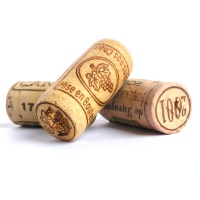 Yes, since it is a natural product, cork can be composted – but with a few warnings.
Yes, since it is a natural product, cork can be composted – but with a few warnings.
In the case of things like wine corks, make sure they are actually cork and not plastic made to look like cork. Synthetic corks are increasingly common in newer wines for a number of reasons – but they won’t rot down in a compost heap. If you’re unsure, cut it open to check – synthetic corks are usually a uniform foaminess inside while real cork is a bit more random and looks a bit woodier.
If it is real cork, make sure you remove any packaging that might be attached to it – for example, plastic screw lids or foil covers.
Cork noticeboards and cork tiles can also be composted but if they’ve been painted or stuck down with glue, leave them out of your heap – not only will they hinder the decomposition process, you’ll potentially be adding a lot of unwanted chemicals to your lovely compost.
As with most composting, break or chop them up if you want them to compost down quicker.
Cork is a “brown” in composting terms – make sure you add some fresh green items (like veg scraps or grass clippings) alongside it to help speed up the composting process.






